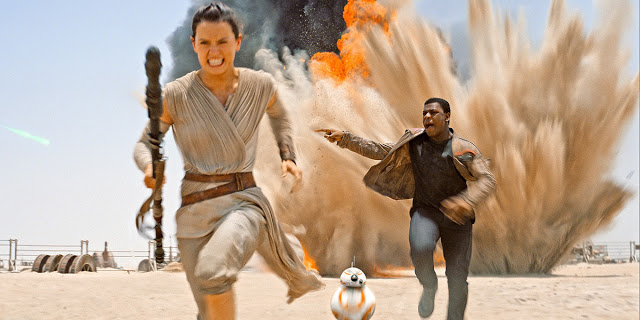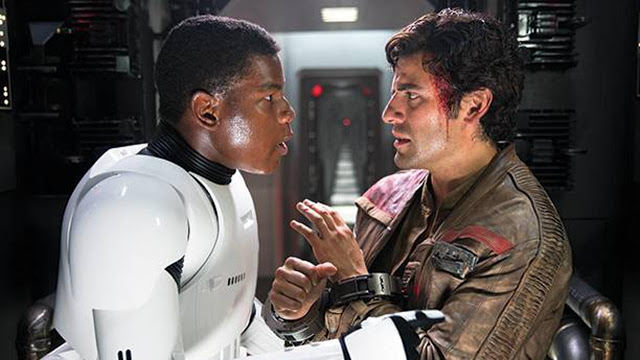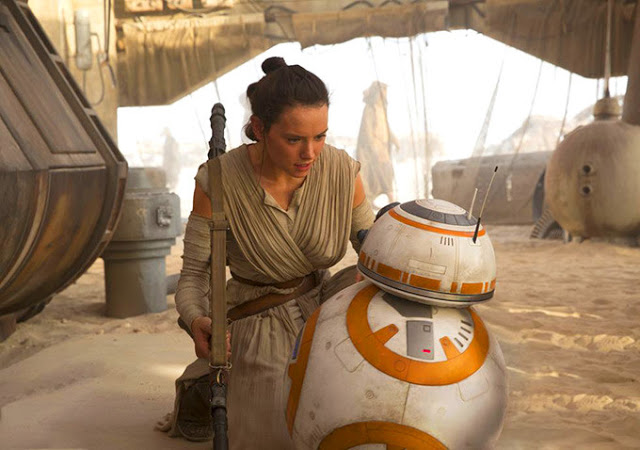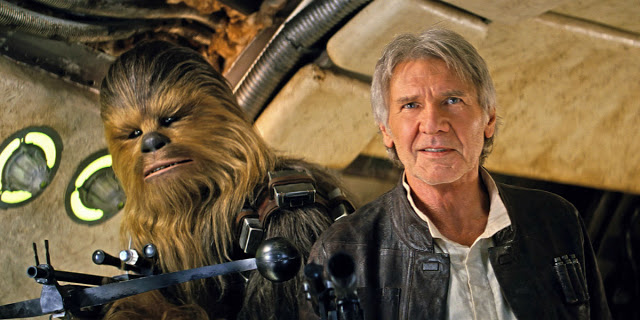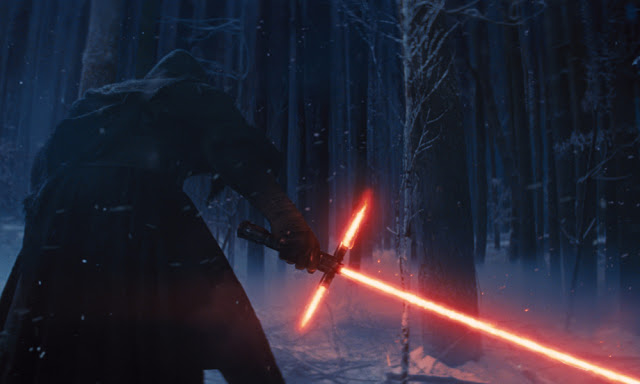Amid all the majestic sights and sounds of Star Wars: The Force Awakens—the dogfights and lightshows, the exotic environments and the aircraft careening through outer space—no image hits harder than that of a stormtrooper’s helmet smeared with blood. That shot, which comes during an otherwise typical firefight early in the film, clubs you with the force of a wampa ice creature, and it establishes that director J.J. Abrams is invested in bringing the humanity back to this towering franchise, with its legions of fans and its box-office dominion. The Force Awakens is as loud and actively busy as any Star Wars movie—this is the series’ seventh episode, in case you needed reminding—but it’s also rooted in its characters, trading George Lucas’s unparalleled mastery of action (and utter disinterest in actors) for some good old-fashioned storytelling. Obi-Wan Kenobi once remarked (somewhat infamously) that stormtroopers shoot straight. Abrams shows us that they bleed.
And so do filmmakers. The digital effects of The Force Awakens are impressively invisible, but you can still see the sweat that Abrams poured into this production, the heartfelt labor of a true fanboy. He’s undertaken quite the challenge, tasked both with servicing the masses of ticket-buyers who consider Star Wars their personal property and with propelling the franchise forward into uncharted space. It’s a line he straddles with extreme caution, but he mostly gets it right. The Force Awakens is not the best Star Wars movie, nor is it the most dazzling. But it remains a sturdy, highly satisfying production that flashes glimmers of true greatness, and it skillfully advances the series’ mythology while simultaneously reuniting us with old friends long gone. This may not be the work of a Jedi master—Abrams is more of a tinkerer than a virtuoso—but then, it’s the everymen who made Star Wars so appealing in the first place.
Everymen are everywhere in The Force Awakens, beginning with Poe Dameron, a cocksure fighter pilot who seems to have spent his childhood boning up on Han Solo novelizations, and who is played with flinty charm by the great Oscar Isaac. As this monstrously ambitious movie opens, Poe is captured by Kylo Ren (Adam Driver, trying his hardest), a lightsaber-wielding heavy who, with his black garb, voice-muffling mask, and imperious demeanor, suggests an off-brand version of the twentieth century’s most iconic screen villain. Their initial encounter camouflages itself as by-the-book cinematic interrogation, until Poe slices through it with a wisecrack (“Do I talk first, do you talk first?”) and a lopsided smile. Beyond affirming what fans of Inside Llewyn Davis and Ex Machina already knew—that Oscar Isaac should be in every movie—that jibe breaks the ice and forcefully reminds you that The Force Awakens is about flesh-and-blood people, not automatons dutifully fulfilling a plot.
Don’t worry, the film has plenty of plot, too—just not an original one. As rousing as The Force Awakens is, its screenplay (co-written by Abrams, Lawrence Kasdan, and Michael Arndt) often feels like a reboot of (what’s now called) A New Hope, the original Star Wars that, a long time ago, transported us to that galaxy far, far away. Once again, a freedom fighter secrets crucial information inside the metal body of a droid, here a roly-poly crowd-pleaser called BB-8 who, like R2-D2 before him, communicates exclusively in beeps, bleeps, and the occasional electronic raspberry. Once again, that freedom fighter is part of an insurgency, this time called the Resistance, which is rebelling against the tyranny of an authoritarian regime, here dubbed the First Order. And once again, that evil empire has constructed a technological terror, now named Starkiller Base, which can obliterate entire planets with the thoughtless push of a button (think the Death Star on steroids). If only a ragtag group of plucky fighters could somehow destroy this fearsome weapon before it eradicates the Resistance once and for all…
Given the acrimony that Star Wars fan have expressed toward George Lucas’s much-maligned prequel trilogy, it’s understandable that Abrams steered his new sequel back to basics. It’s also disappointing. Part of the allure of making new episodes in the Star Wars universe—beyond the gazillions of dollars to be raked in—is the limitless sense of possibility available to their creators. Return of the Jedi may have ended on a note of untainted triumph, but that was more than three decades ago, and we’ve all wondered: What has happened since? Out of the millions of fanboys, Abrams received the impossible chance to answer that question himself, to treat this canonical property on a blank canvas. Instead, he’s stenciled a previously existing painting, returning the series to a place of familiarity and safety. At times, The Force Awakens feels like a smartly curated update of an old classic, less Episode VII than Episode 4.1.
But everything old is new again, and what this movie lacks in originality, it compensates for with brash enthusiasm and spunky personality. Remember that bloodied stormtrooper? His name is Finn (John Boyega, excellent), and after seeing death close up, he decides he’s not thrilled about his employer’s mission of mass murder. With Poe’s help, Finn escapes the First Order and crash-lands on Jakku, an arid planet with lots of sand dunes and little wealth. (Sound familiar? Never mind.) There, he encounters Rey (Daisy Ridley, a smashing success), an impoverished scavenger who knows her way around a spacecraft and who has conveniently become the de-facto custodian of BB-8. Oh, and that critical data housed inside BB-8’s shell? It provides a clue to uncovering the whereabouts of some guy named Luke Skywalker, who, as the opening crawl bluntly informs us, has vanished, to the consternation of both the First Order (which wants him dead) and the Resistance (which has a hunch that he just might prove useful). Luke’s role in this conflict will be resolved in future episodes; in immediate terms, the map to Skywalker is essentially a MacGuffin, as it results in the entire First Order hunting Finn, Rey, and the droid they’re most definitely looking for.
As busy as The Force Awakens sounds, Abrams remains a shrewd storyteller, and he pushes his narrative forward with a streamlined economy, centering the movie’s electric opening act on the burgeoning relationship between Finn and Rey. It’s a perilous proposition, grounding such a recognized universe in brand-new characters, but it works beautifully, thanks to some sharply staged buddy comedy and to the lead duo’s nimble performances. Their rapport is hard to classify—it is not quite romantic, not quite friendly—which makes it all the more intriguing, and Finn and Rey’s interactions result in some of the most human moments of the entire franchise. In a series obsessed with mythological exceptionalism, Finn is a gratifyingly ordinary figure, and Boyega, who turned heads a few years ago in the cult English sci-fi film Attack the Block, adroitly makes him both a stalwart and a fool; exhibiting excellent comic timing, he delivers a number of hilarious pratfalls, but he nevertheless communicates the heroism of the ordinary.
He also graciously cedes the spotlight to Ridley, an untested actress who fearlessly makes Rey her own. Rey is an ace pilot and an able warrior, as is quickly established during the movie’s first and most robust action sequence, in which she and Finn commandeer a suspiciously familiar-looking, hunk-of-junk spaceship and find themselves in a dogfight, the camera racing after them as they hurtle into tight dark spaces and then back out into bright blue sky. But she is also a novice, still discovering herself and trying to understand her place in this gigantic world, and Ridley highlights both her toughness and her vulnerability. It’s tempting to view Rey through the lens of feminist empowerment—in one amusing moment, she yelps “Stop taking my hand!” after Finn instinctively reaches to protect her—and to be sure, the Star Wars films have always been a bit skimpy with well-developed women (Princess Leia notwithstanding). But Rey is too vibrant a character to function as a mere political corrective. Instead she simply reminds us, with unimpeachable and fiery clarity, that chicks can be heroes too.
And so can old guys. Look, it’s easy to condemn Disney for choosing to continue the Star Wars mythos, to accuse it of shamelessly trading on the cherished memories of our youth for cold commercial profit. But when Han Solo suddenly appeared at the bay of the Millennium Falcon, I felt a rush of pure elation, a thrill that persisted thanks to Harrison Ford’s sly, evidently gleeful performance. As you might expect, old faces resurface throughout The Force Awakens, including that old Laurel-and-Hardy tandem of C-3PO (Anthony Daniels) and R2-D2 (Kenny Baker), Carrie Fisher as Leia, and of course Peter Mayhew as Chewbacca, still one of cinema’s most durable sources of silent comedy. But where these appearances feel obligatory, the presence of Han really sticks, not just because he functions as valuable connective tissue to the prior installments (in case you had any doubts, he has a bad feeling about this), but because Ford’s effortless acting—a wonderful combination of playfulness and pathos—amplifies the film’s dramatic stakes.
As terrific as The Force Awakens is with its heroes—in one of the movie’s best runners, Rey proves herself every bit as gifted a pilot as Han, to the latter’s perpetual bewilderment—it’s less successful with its villains. Admittedly, Kylo Ren is a sneakily revolutionary character, and Driver’s apparent wobbliness skillfully masks the novelty of a figure who’s trying to be bad, in defiance of his better angels. (He’s also armed with a cross-hilted lightsaber, which is pretty cool.) But the film’s big bad, a glowering giant named Snoke (Andy Serkis), is a borderline parody who unfortunately recalls Thanos, the similarly oversized supervillain whom Josh Brolin portrays in the Avengers franchise. And the First Order, with its shrill Nazi-esque imagery and its strident commandant, General Hux (Domhnall Gleeson, overdoing it), is a limp caricature of a totalitarian state, too outrageous to engender real fear.
That’s forgivable, given that the Star Wars movies are less about fear than fun. What’s curious is that, as lavish and well-appointed as The Force Awakens is (John Williams’s boisterous score hardly hurts), it isn’t especially thrilling from an action perspective. Sure, Abrams stages the requisite sound-and-fury sequences with care, but while they’re capably choreographed and properly lit—one of the nice things about the Star Wars universe is that the gunfire occurs in the form of brightly colored laser blasts, assisting us in discerning who’s shooting at what—they’re more adequate than amazing. Abrams is a supremely talented master of ceremonies—it’s astonishing just how much story he juggles here while still keeping the trains running on time—but he lacks a real visual signature (his use of soft wipes as transitions is obviously borrowed from Lucas), and his workmanlike approach makes one wonder just what Looper‘s Rian Johnson, a director with greater panache, might do with Episode VIII come 2017.
But such speculation is pointless—as a wise creature once said, always in motion is the future—and looking ahead disserves this movie and its tangible, valuable accomplishments, which extend to its third act (a rarity in franchise fare). The Force Awakens delivers legitimate catharsis in its final scenes; both a lightsaber duel in a snowy wood and a tremulous tête-à-tête on a narrow bridge within a cavernous arena achieve a haunting, elegiac intimacy. Those moments affirm the value of blockbuster filmmaking, demonstrating how the massive machinery of Hollywood can be harnessed to tell powerful, human stories. It is certainly possible to envision a better version of The Force Awakens—riskier, livelier, with more surprises and less fan service. But this movie, with its strong characters and solid storytelling, is a salve for those who had despaired (wrongly) that the magic had leaked out of the Star Wars franchise. It may not be a perfect movie, but it is more than enough to give all of us new hope.
Jeremy Beck is the editor-in-chief of MovieManifesto. He watches more movies and television than he probably should.

